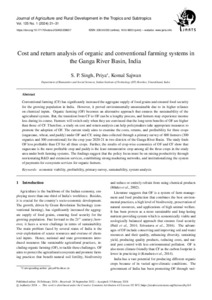| dc.date.accessioned | 2024-03-01T08:52:14Z | |
| dc.date.available | 2024-03-01T08:52:14Z | |
| dc.date.issued | 2024-02-26 | |
| dc.identifier | doi:10.17170/kobra-202402239637 | |
| dc.identifier.uri | http://hdl.handle.net/123456789/15520 | |
| dc.language.iso | eng | |
| dc.rights | Namensnennung 4.0 International | * |
| dc.rights.uri | http://creativecommons.org/licenses/by/4.0/ | * |
| dc.subject | economic viability | eng |
| dc.subject | profitability | eng |
| dc.subject | primary survey | eng |
| dc.subject | sustainability | eng |
| dc.subject | system analysis | eng |
| dc.subject.ddc | 630 | |
| dc.title | Cost and return analysis of organic and conventional farming systems in the Ganga River Basin, India | eng |
| dc.type | Aufsatz | |
| dcterms.abstract | Conventional farming (CF) has significantly increased the aggregate supply of food grains and ensured food security for the growing population in India. However, it proved environmentally unsustainable due to its higher reliance on chemical inputs. Organic farming (OF) becomes an alternative approach that ensures the sustainability of the agricultural system. But, the transition from CF to OF can be a lengthy process, and farmers may experience income loss during its course. Farmers will switch only when they are convinced that the long-term benefits of OF are higher than those of CF. Therefore, a study on cost and return analysis can help policymakers take appropriate measures to promote the adoption of OF. The current study aims to examine the costs, returns, and profitability for three crops (sugarcane, wheat, and paddy) under OF and CF, using data collected through a primary survey of 600 farmers (300 organics and 300 conventional) for the crop year 2020-21 in two districts of the Ganga River Basin. The study finds OF less profitable than CF for all three crops. Further, the results of crop-wise economics of OF and CF show that sugarcane is the most profitable crop and paddy is the least remunerative crop among all the three crops in the study
area under both farming systems. The findings suggest that the policy focus must be on raising productivity through reorientating R&D and extension services, establishing strong marketing networks, and institutionalizing the system of payments for ecosystem services for organic farmers. | eng |
| dcterms.accessRights | open access | |
| dcterms.creator | Singh, S. P. | |
| dcterms.creator | Priya | |
| dcterms.creator | Sajwan, Komal | |
| dc.subject.swd | Indien | ger |
| dc.subject.swd | Bologische Landwirtschaft | ger |
| dc.subject.swd | Konventionelle Landwirtschaft | ger |
| dc.subject.swd | Nachhaltigkeit | ger |
| dc.subject.swd | Wirtschaflichkeit | ger |
| dc.subject.swd | Wirtschaftlichkeitsberechnung | ger |
| dc.subject.swd | Systemanalyse | ger |
| dc.type.version | publishedVersion | |
| dcterms.source.identifier | eissn:2363-6033 | |
| dcterms.source.issue | No. 1 | |
| dcterms.source.journal | Journal of Agriculture and Rural Development in the Tropics and Subtropics (JARTS) | eng |
| dcterms.source.pageinfo | 21 - 31 | |
| dcterms.source.volume | Vol. 125 | |
| kup.iskup | false | |


